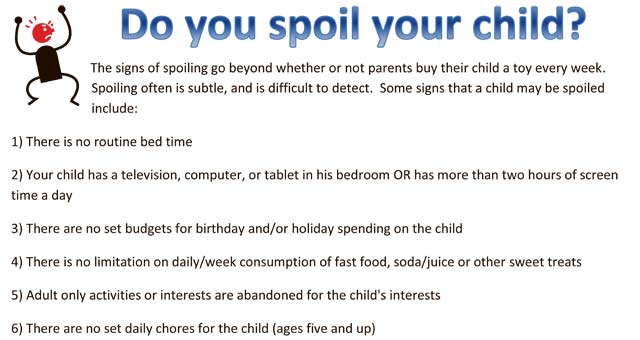Children require a constant balance between giving them attention and intentionally ignoring them — this task is difficult to master. A parent’s motivation to raise happy children often is at odds with teaching them how to be responsible.
Raising a child also taxes your wallet. A 2014 U.S. Department of Agriculture report estimated that new, middle income parents will spend around $241,080 to raise their child. The cost of caring for children has risen almost 3 percent in the past three years alone, and that doesn’t even include the cost of college.
Parents don’t enjoy spending so much, but they tend to feel guilty if their children don’t have modern day amenities. Confusion and being conflicted are common. For example, parents grumble about cell phones but continue to pay the monthly fees. They complain about video game use but purchase systems for main holidays.

The phrase “spoiling kids” emerged only in the past 30 years. The goal has become raising happy children with high self esteems who always feel special. This trend fuels a child centric market. In 2013, the average parent from the U.S. spent $371 on toys for each child. The amount one child receives is minuscule in comparison to the combined amount for all children globally — the toy market grossed more than $84 billion in 2012.
Though splurging on your child from time to time and always loving and respecting them leads to positive outcomes as adults, over indulging can prevent them from learning how to cope with the limits and frustrations inherent in adult life. If executed with consistency and clarity, setting realistic limits and raising expectations for a child should lead to success later in life.
Parents of spoiled children have difficulty with maintaining boundaries. A child is spoiled if he or she receives what makes him or her happy in the moment without effort or, more importantly, without having to work for it. Sometimes it’s OK to treat our children; it’s even healthy to splurge. But if your child is getting what he or she wants immediately more than 75 percent of the time, then it is time to reconsider your parenting strategy.
Parents must make a conscious list of things they will support and things a child must learn or do by themselves. This list will change as the child ages. For example, you may pay for 100 percent of the clothes when your child is in elementary school, and then only pay 50 percent of the clothes by the time they are in high school. You may give them 30 minutes of screen time at the age of 8 and then an hour at the age of 16. The child may be expected to help put the groceries away at age 10 and expected to cook a weekly meal for the family at age 17.
There are benefits of depriving children of things that make them happy in the moment.
Consider:
1) research shows that the more effort we put into earning
something, the more we value it once we have it
2) practicing disappointment and how to get over it builds coping skills
3) deprivation in the short term creates gratitude
4) delaying gratification as a child helps build discipline as an adult.
Learning how to set limits takes patience and practice. Experts, celebrities and professionals have written whole books on how to set limits with a child. Local parenting classes or providers can help parents feel a little less confused on how to say “no” when it matters.
Children will thank you for it … just not right now.
(Dr. Krystal White is a pediatric psychologist specializing in healthy family habits and evaluation of developmental disorders)
Health
How saying ‘NO’ is healthy
(Visited 336 times, 1 visits today)


